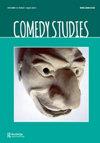Contending comically: Mahatma Gandhi’s cartoons in South Africa and its after effects
Q1 Arts and Humanities
引用次数: 0
Abstract
Abstract In a postcolonial country, colonial cartoons prove an indispensable source for voicing contemporary public opinion either for initiating resistance towards colonizer’s leadership or for suppressing the colonized who dared to launch resistance in the first place. Simultaneously, humour generated through these cartoons is valuable in identifying the iconicity of an individual as the extent of distortion employed in caricaturing them explains the level of popularity enjoyed by them. This implies that a cartoon can effectively increase/decrease the number of followers of a person who is either glorified or belittled through distortions. In this article, I argue that colonial cartoons despite of their attempts to ridicule Mahatma Gandhi for his rivalry with the British administrators paradoxically went on to glorify him. Cartoons converted him into a popular icon, the one who was easily recognized by masses. Their intention of generating humour by depicting Gandhi in cartoons made people visualise enormous trouble that he was creating for colonizers thus turning him into a celebratory figure against British in South Africa. This moral shaming created from visual depiction of inhuman British rule led to withdrawal of many horrendous acts and laws which were primarily meant for exploitation of Indian immigrants in South Africa.滑稽的争论:圣雄甘地在南非的漫画及其后果
在一个后殖民国家,无论是发起对殖民者领导的反抗,还是镇压最初敢于反抗的被殖民者,殖民漫画都是表达当代民意不可或缺的来源。同时,通过这些漫画产生的幽默在识别个人的偶像性方面是有价值的,因为在漫画中使用的扭曲程度解释了他们受欢迎的程度。这意味着漫画可以有效地增加/减少一个人的追随者的数量,通过扭曲或美化或贬低一个人。在这篇文章中,我认为殖民漫画尽管试图嘲笑圣雄甘地与英国管理者的竞争,但却自相矛盾地继续美化他。漫画把他变成了一个受欢迎的偶像,一个很容易被大众认出来的人。他们的意图是通过在漫画中描绘甘地来制造幽默,这使人们想象到他正在为殖民者制造巨大的麻烦,从而使他成为南非反对英国人的庆祝人物。这种对非人道英国统治的视觉描绘所造成的道德耻辱,导致许多主要是为了剥削南非印度移民的可怕行为和法律被撤销。
本文章由计算机程序翻译,如有差异,请以英文原文为准。
求助全文
约1分钟内获得全文
求助全文
来源期刊

Comedy Studies
Arts and Humanities-Literature and Literary Theory
CiteScore
0.60
自引率
0.00%
发文量
26
 求助内容:
求助内容: 应助结果提醒方式:
应助结果提醒方式:


